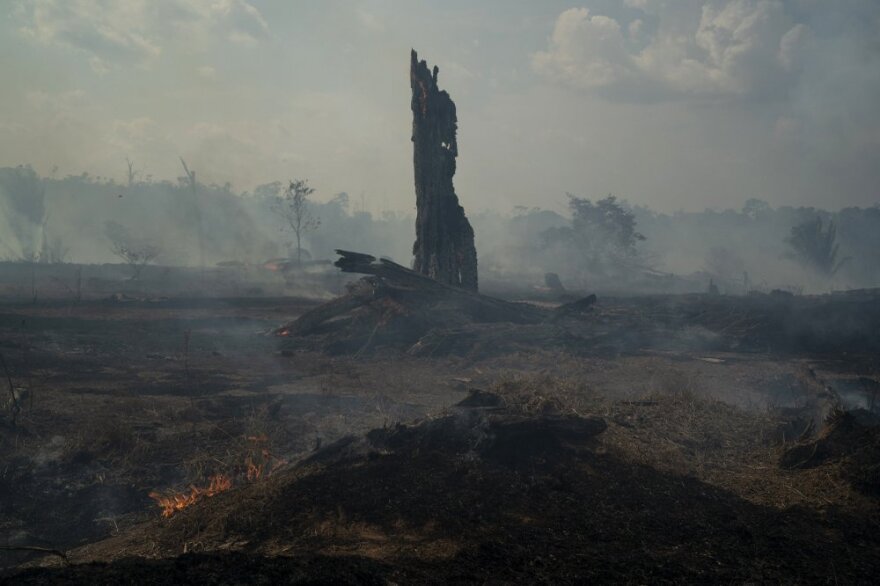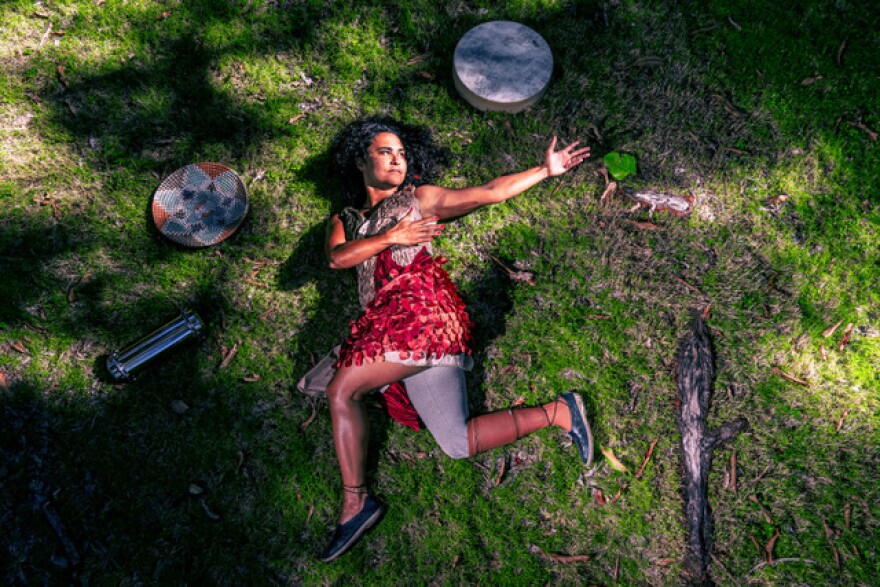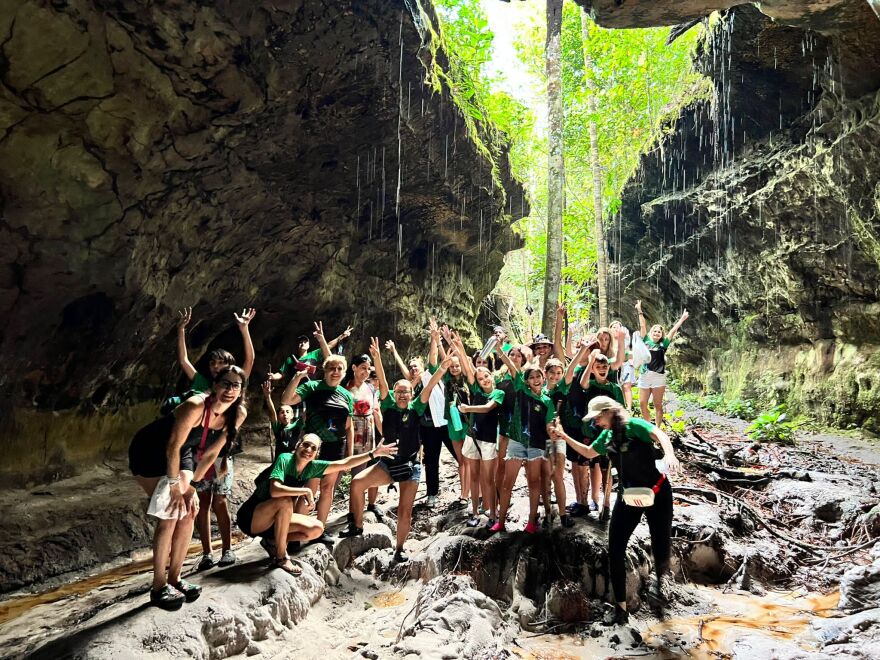Protecting the beleaguered Amazon rainforest has become a front-and-center issue in Brazil’s presidential election this month — and a lot of folks think it should also be a focus in places like Miami, whose eco-futures are, like it or not, tied to the Amazon's.
Miami realtor Indra Rizzato — who was born in Manacapuru, Brazil, on the Amazon River — is at the head of that movement.
“When someone is born in the Amazon, I think you start to realize your responsibility as a human being," Rizzato told me.

The growing destruction of the Amazon rainforest, Rizzato said, has deepened the sense of environmental responsibility she grew up with.
So in June, she convinced 20 families from her daughter’s Miami elementary school, Ada Merritt, to join her family on a visit to her rainforest home — to sites like the majestic Iracema waterfalls north of Manacapuru in Amazonas state.
It was one way, she said, that she could raise global awareness of what may be lost if Brazil doesn’t change course.
“Those parents got very emotional," Rizzato recalled.
"At that point they really understood how important is the Amazon rainforest to the rest of the planet.”
READ MORE: Amazon rainforest no longer just a cause for rock stars. Climate change made it local.
Standing beneath the Amazon’s lush and endless canopy, it’s easy to see why it’s called the lungs of the earth — and why the world is paying attention to this month’s presidential election in Brazil, where two-thirds of the rainforest sits.
"I really hope that this election moves Brazil in the right direction, towards sustainability," said University of Miami biology Ph.D. student Jacqueline Ballantyne, who's currently doing biodiversity research in the Amazon rainforest's Yasuni biosphere in Ecuador.
So far the election is moving in the direction scientists like her want: former Brazilian President Luiz Inácio Lula da Silva — who oversaw a decline in Amazon deforestation in the 2000s and is considered the more pro-conservation candidate — won the first round on Sunday.
Lula now heads to what looks to be a tightly contested October 30 run-off against incumbent President Jair Bolsonaro, who is widely criticized for development policies that have reduced the Amazon rainforest. Ballantyne believes that what's at stake is the environmental future of Brazil. And of the U.S. city where she studies.

“Folks in Miami should remember the decrease in the amount of carbon storage the Amazon can provide will have cascading effects in the rate of climate change and the oceans rising," she said by WhatsApp, as growling howler monkeys and screaming piha birds sounded off in the canopy above her.
"And seeing Miami going underwater in the near future.”
Each year the Amazon absorbs 600 million metric tons of carbon dioxide — the greenhouse gas responsible for global warming and, in turn, sea-level rise. But that’s only half what it was sucking in at the turn of the century, because Brazilians are burning, chopping and clearing so much of the rainforest.
Under Bolsonaro that destructive trend has hit record levels — almost 4,000 square miles (10,000 sq km) deforested since he took office in January 2019.
As a result, "really for the first time in Brazil, there’s a presidential election in which the Amazon is figuring among the top topics of debate," said Robert Muggah, co-founder of the Igarapé Institute, a Brazil-based think tank that monitors issues like Amazon deforestation.
The Amazon’s burning smoke is reaching cities and the skies literally have gone dark — so for the first time many urban Brazilians are aware of this thing called the Amazon.Robert Muggah
Muggah points out scientists fear the Amazon may be only a few decades away from a tipping point of 20-to-25% deforestation that "could mean a carbon bomb for the planet." And that looming crisis, he says, is affecting Brazilians who used to be able to ignore it.
“The Amazon’s burning smoke is reaching cities — including the largest, São Paulo, the economic heart of Brazil," he said. "And the skies literally have gone dark. So I think for the first time many urban Brazilians became aware of this thing called the Amazon.”
Another reason the Amazon is a factor in the election: the deforestation, Muggah says, has also made Brazil a global environmental pariah. That got worse this summer when a British journalist Dom Phillips and Brazilian activist Bruno Pereira were murdered while investigating ecological crimes in the Amazon.
CRIMINAL ECO-SYSTEM
The Igarapé Institute has recently issued several reports on the illegal logging, mining and farming — and the "criminal eco-system in the Amazon," as Muggah puts it.
"Ninety-five percent of Amazon deforestation is illegal," he said, "and so often it's in the service of other crimes, even cocaine production."
It's not only shredding the rainforest, he adds, but threatening its indigenous peoples, who are arguably its most ardent front-line defenders.
"The violent vitriol against Brazil's indigenous, the actual violence committed against them, has been unparalleled in recent years under Bolsonaro," said Tracy Devine Guzmán, a University of Miami Latin American Studies professor and the author of "Native and National in Brazil: Indigeneity After Independence."
"And so has the impunity," she adds. "There really is no state apparatus in place right now to protect" Brazil's indigenous communities.

Devine Guzmán points out the recent emergence of indigenous leaders in Brazilian politics is one promising development. On Sunday, for example, two indigenous activists, Sônia Guajajara and Célia Xakriabá, both won seats in Brazil's lower chamber of Congress.
That was cause for celebration for Brazilian-American dancer and Miami native Stephanie Bastos. “I am not many generations away from the indigenous in Brazil, " Bastos said, "so I’m reclaiming that identity.”
Bastos has indigenous family roots in Brazil’s Amazon state of Pará. As threats to the Amazon grow, she’s sought out more indigenous and ecological themes in her dance work, including performances this year of Sandra Portal-Andreu's "Terra Firma," part of the "Prelude to 2100" production, at the Deering Estate here in Palmetto Bay.
“These are the original people of Brazil," said Bastos. "If we lose them and the Amazon, we lose Brazil.”
Bastos, like many Amazon activists here and in Brazil, says South Floridians can help the rainforest by, for example, not buying furniture made from wood (especially mahogany) illegally chopped there or meat illegally farmed there.
“Not enough people," she said, "make that connection."
But she says folks in climate change-vulnerable places like Miami can no longer afford not to make that connection.






